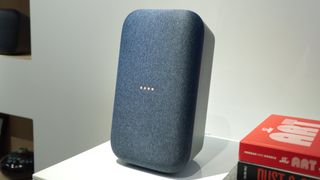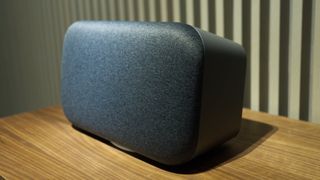Hands on: Google Home Max review
A bigger and louder Home for your home
OUR EARLY VERDICT
While not for everyone, the Home Max takes your tunes to the next level with strong and intelligent hardware. Both Google and Apple are offering similar speakers, but we're not sure yet which is the best option for most.
FOR
- Simple design blends in
- Truly powerful
- Separates the lows, mids, highs with a knife
AGAINST
- More expensive than HomePod
- Quite heavy at 11 pounds
The Google Home Max turns the Google Assistant into your very own personal DJ. Well, the same can be said about the Google Home and the Google Home Mini, but the Max is the only one suited to rock the house thanks to its impressive hardware.
But of course, this is Google we're dealing with, so you'll also find a hearty dose of artificial intelligence smarts built into the Max. This, in a way, plays just as crucial a role in delivering your music in a crisp, room-filling manner.
It's tough to convey the worthiness of an audio product, especially one that claims to take things to the "Max" as this one does. But as someone who has reviewed many headphones and Bluetooth speakers, I can confidently say that there's something special here.
We didn't have a chance to test the Max outside of Google's controlled environment, but the demo that showed off what a single Max could do, as well two paired up, left us wanting more.
(Update: The Max may release on December 11, if Best Buy's product page is to be believed. Pointed out by 9To5Google, the US retailer appears to have jumped the gun ahead of Google's own announcement of its speaker's release. If true, eager listeners won't have to wait long, that is, unless they reside outside of the US, as Google hasn't specified if or when the Google Home Max will arrive.)
Google Home Max price and release date
The Max debuts in December for $399 (around £300 / AU$510) and unfortunately for our friends outside of the US, it's not making its way outside of North America just yet.
It was a similar story when the original Google Home was first announced. Like the Max, the speaker was originally exclusive to North America, before making its way to other territories after around six months.
Although a day-in-date release worldwide would be preferable, we hope that people in other territories won't have to wait long to see the Max released.

Design
The Google Home Max piggy-backs on the look of the other Home models in that it keeps it super simple on the design front. Unlike the others, you'll know this is a speaker right away, but Google has worked in a bit of elegance here to make its hefty 11-pound build work in its favor.
Across the front is a mesh fabric that hides the drivers. On the Max's top, you'll see a small line that indicates the location of the speakers touch-friendly sensor that's used for adjusting volume controls and skipping throughout your favorite album, that is, unless you'd rather do it with your voice.

The speaker's rear plays host to a few features. There's an on/off switch right in the middle, but near the corner is where the included power supply plugs in. Next to it, there's a 3.5mm jack to output to your preferred device, as well as a USB-C port, which I'm told is used for piping in an ethernet connection. Google didn't state if it was including one in the box.
One of Max's more interesting features is that it doesn't feature permanent rubber feet. It can stand either horizontally or vertically without scuffing the table (or the Max itself) thanks to its magnetic rubber platform that can easily be taken off and relocated to shift its orientation.

Performance
Equipped with two custom 0.7-inch tweeters and two 4.5-inch dual-excursion woofers, the Max impresses right out of the gate. As we mentioned, the Max was demonstrated in a controlled environment, so we're really looking forward to testing this out in a bunch of different environments.
Needless to say, an 11 pound speaker is capable of so much more than the other Google Homes, but we were really impressed with just how loud the speaker got, all without showing any signs of reaching a threshold.
To that end, each and every slice of the music profile sounded crisp, clear and without compromise in the sound delivery – and this was just with an MP3. We'd love to try this out with a vinyl record.
Google's Smart Sound technology utilizes artificial intelligence to dynamically shift the delivery of your tunes. This can be based on room size, obstacles in the room, time of day, and where the Max is located in the room. Much like the Apple HomePod, Google is really touting the smarts in this speaker as being just as central to the experience as the hardware is.
Early verdict
With the Max, there's now a Google Home suited for all sorts of living quarters – from the bedroom, the kitchen and the garage. This one just so happens to be about rocking louder and being smarter than the others.
Coming in at $399, this isn't as easy to plunk down on as the other Home models – especially when stacked up against the $49 Google Home Mini – but doing so means treating yourself to deeper, louder and smarter experience.








0 comments: